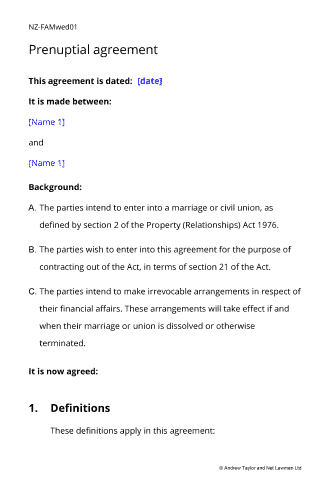Pre-nuptial agreement

Document overview


- Length:18 pages (5000 words)
- Available in:
 Microsoft Word DOCX
Microsoft Word DOCX Apple Pages
Apple Pages RTF
RTF

If the document isn’t right for your circumstances for any reason, just tell us and we’ll refund you in full immediately.

We avoid legal terminology unless necessary. Plain English makes our documents easy to understand, easy to edit and more likely to be accepted.

You don’t need legal knowledge to use our documents. We explain what to edit and how in the guidance notes included at the end of the document.

Email us with questions about editing your document. Use our Lawyer Assist service if you’d like our legal team to check your document will do as you intend.

Our documents comply with the latest relevant law. Our lawyers regularly review how new law affects each document in our library.
About this prenuptial agreement
A prenuptial agreement sets out how assets and liabilities will be divided if you separate permanently or if your marriage ends.
Making a plan in advance should help you avoid expensive divorce settlements, help you keep items of sentimental value such as family heirlooms or property, and help you control who inherits your wealth.
Many people consider planning for break-up unromantic shortly before a wedding or civil partnership. However, preparing a prenup emphasises that the reason for marriage is love and not money, and can give both people confidence about what will happen should the marriage fail.
Why use this prenuptial agreement
- provides security during and after marriage to both people;
- avoids future disputes over how assets should be split and what each person contributed;
- helps speed up the divorce process and saves divorce costs;
- helps ensure that items with sentimental value remain with the person to whom they matter most;
- helps ensure that the people you choose (such as children from an earlier relationship) inherit your wealth;
- prevents your wealth from being given away shortly before break-up;
- helps protect business assets from being split and sold;
- makes a separation less emotionally stressful by removing the need to negotiate over as many things.
Is a prenuptial agreement legally binding?
Prenuptial agreements have been permitted in New Zealand since enactment of the Matrimonial Property Act 1976. Section 21 of the Property (Relationships) Act 1976 expressly authorises that a husband and wife, civil union partners, de facto partners, or two persons in contemplation of entering into a marriage, civil union or de facto relationship may contract out of the provisions of the Act. The special requirements that must be met for contracting out agreement to be valid as follow:
- must be in writing;
- both parties must receive independent legal advice;
- signatures need to be certified by a lawyer;
- the lawyer must certify that, before that party signed the agreement, the lawyer explained to that party the effect and implications of the agreement.
Alternative documents
We also stock a simpler version of this document that has been written for couples who are likely each to be financially independent before the marriage or partnership and for whom the concern is about ensuring that wealth and assets remain in the possession of whichever one brought them in, should the marriage fail.
We expect that this alternative document will be more suitable for older couples who have already accumulated wealth, and who perhaps are marrying for a second time.
See Prenuptial agreement: protection of property.
Agreement contents
The Net Lawman pre-marital agreements have been written to help you to comply with the suggested legal requirements.
This agreement covers a very wide range of possible outcomes and also deals with many matters to be agreed during your marriage.
There is extensive coverage of property, possessions, investments.
Children arrangements are covered broadly and shortly, because circumstances at divorce can be very different to those at marriage and a judge will make an order based on what he sees at the time.
This agreement covers the following:
- the parties’ personal details;
- relevant dates and application of principles likely to be required by law;
- ownership of the home now;
- separate ownership of property and possessions;
- many alternative arrangements for ownership of assets;
- joint bank account;
- sharing living expenses;
- children arrangements and after separation;
- property of each party remains his own;
- dealing with family home;
- children arrangements;
- financial support of children;
- financial maintenance of one of you by the other;
- prevention of one person reducing joint wealth before separation by giving away assets;
- dealing with family company and / or jointly owned business;
- capital calculation and transfer;
- promise of confidentiality;
- if one of you should die;
- other legal provisions to protect your interests;
- final statement of understanding of legal requirements.

Recent reviews
THE ADDITIONAL NOTES AND INFORMATION PROVIDED WERE LIKEWISE MOST HELPFUL, CLEAR AND INFORMATIVE.
All rights reserved
